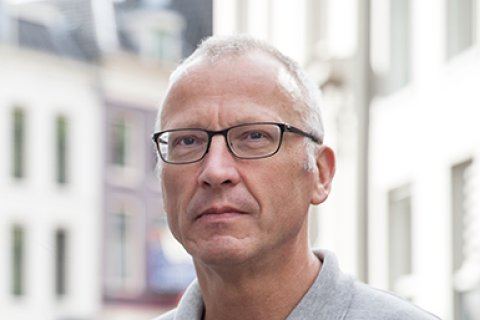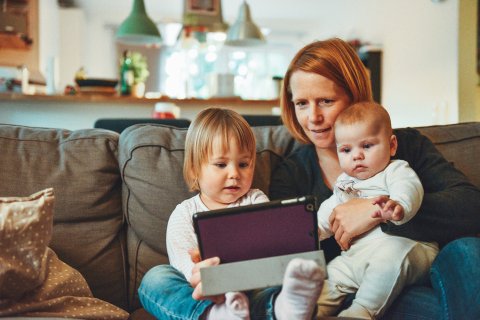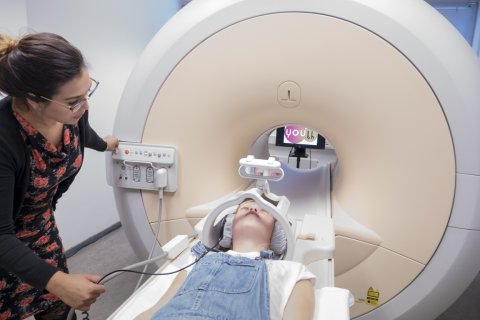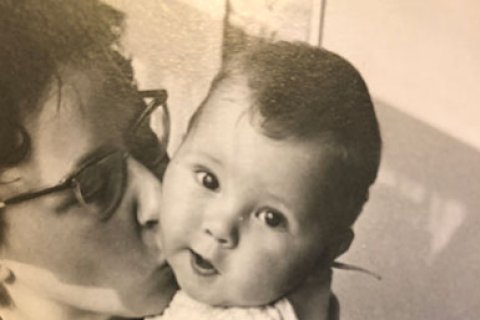Psycholinguist Frank Wijnen
Professor of Psycholinguistics Frank Wijnen has a special interest in language acquisition and developmental language disorders. His research group focuses on the neurocognitive basis of language acquisition in young children. "It's an exceptionally puzzling process. I want to gain a better understanding of how language as a human skill works with and builds on other cognitive skills." The theme The first 1001 days of a child's life may allow him to do so.

"Virtually all children learn their native language more or less automatically. That is an uncontrolled process', said Frank Wijnen. 'All you have to do is expose children to language." This process is anything but simple: learning your native language is a concerted action involving different cognitive processes in the brain. Science has yet to figure out exactly how that works. Wijnen: 'Language acquisition is an exceptionally puzzling process. We are trying to determine which cognitive mechanism in the brain is behind it'.
The processes behind early language acquisition
Frank Wijnens' became personally interested in language development when he was a psychology student: "I became a father before I graduated, and this sparked my interest in developmental processes. 'Soon the baby will start talking. What a unique process. I should learn more about that'."
Some skills are built into the brain at birth. But how is it that the brain works this way?
Just like in his own research, language development is central to the theme The first 1001 days of a child's life. 'And especially the neurobiological and cognitive processes behind it. We want to get a better and more comprehensive picture of all factors that are involved in this, such as innate skills that a child already has at birth." You learn to differentiate words through statistical pattern recognition, for example. "That's built into the brain. But how is it that the brain works this way? That is another question for biologists."
Biology and environment
Wijnen himself uses behavioural research to study language development. "We want to connect it with research into the development of the brain." All developmental processes are an interaction between your genetic baggage and your environment. Wijnen: "Developmental processes are the result of a complex interaction between biological and environmental factors. We want to clarify how these two components contribute to the process, and how it is that children differ from each other."

How a child goes through the language development trajectory is thus partly a question of predisposition, but is largely determined by the linguistic richness of the environment. "How and how much do parents talk to their children? Considerable differences exist, which are related to, among other things, socio-economic status. That language supply helps determine the level that children achieve when it comes to vocabulary, for example, and skill in the effective use of language in all kinds of communicative situations."
Disrupted language development
Approximately 5% of children have a developmental language disorder (DLD). "It takes them a while to learn their native language. Expanding their vocabulary and learning grammar is a slow process and tends to stagnate", said Wijnen. There is no clear cause (medical, psychological or parenting). Children with a DLD therefore appear 'normal', but they struggle terribly with learning their native language.

Comparing children with and without a DLD can provide a great deal of knowledge about the functioning of the brain. 'The question is: what causes language acquisition to run into delays in children with a DLD? Which system in the brain is affected? Along with the UMC Utrecht Brain Center my research group has taken the first step, with an MRI study involving children with this condition. Hopefully, this theme will also give us the opportunity to study younger children via the Wilhelmina Children's Hospital'. The children's hospital is currently conducting an MRI study on brain development around birth, as part of the YOUth cohort study.
Building bridges
Wijnen is curious about the study on cerebral organoids by his fellow team member Jeroen Pasterkamp. 'They grow small pieces of brain in the lab. You can use these to see what certain stressors, chemical or hormonal factors do in the development of the brain. If we subsequently look at the same phenomenon from the perspective of behavioural science and linguistics, I hope that we can bridge the gap that still exists there'.
The language development expert regards the collaboration with other disciplines as enriching. 'You start seeing connections that you did not initially see. To put it in black-and-white terms: I was never very interested in the effects of environmental factors on language. But when you learn to see environmental factors in a different way, it suddenly becomes a different story. I had never really considered the idea that something like food or stress hormones can influence language development. Everything is so much richer than I had ever imagined'.
Frank Wijnen's first 1001 days

"According to my mother, I started talking late. Once I was able to, however, I commented on everything I saw – including people's appearances on the street and on the bus, much to my mother's extreme embarrassment at times."
Frank Wijnen is also the director of the Utrecht Institute of Linguistics OTS (the research institute for linguistics at the Faculty of Humanities), and member of the Dynamics of Youth programme committee. He is also leading a new study on children with 22q11.2 Deletion Syndrome, the effects of which include delayed language development at an early age.

